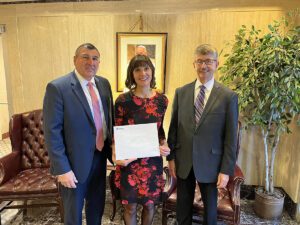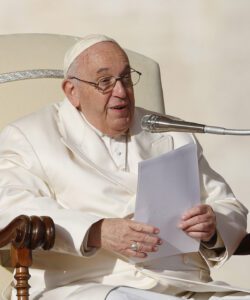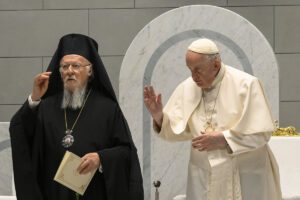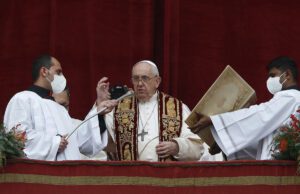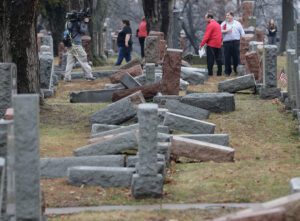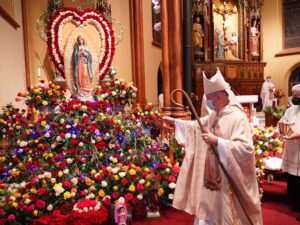
Through the intercession of “Virgen de Guadalupe,” plans for the Feast of Our Lady of Guadalupe in December are proceeding in many different parishes.
Particularly in the areas of large Latino populations in the Diocese of Scranton, the annual observance commemorates the appearance of the Virgin Mary to a Mexican Indian peasant — now venerated as Saint Juan Diego — in December 1531 in Tepeyac, near present-day Mexico City.
The Blessed Mother’s appearance is believed to have resulted in millions of conversions to Catholicism, and her message of hope continues to inspire those of Hispanic descent.
In 1946, Pope Pius XII declared Our Lady of Guadalupe as Patroness of the Americas.
The Our Lady of Guadalupe feast on Dec. 12 will culminate a host of celebrations being planned throughout the Diocese, especially in those parishes made up of significant Hispanic/Latino communities.
Everyone is welcome to join in the following celebrations:
East Stroudsburg
Saint Matthew Parish
December 1 to December 11
7:00 p.m. Rosary in the Church
(Except December 4 and 5)
December 4
Welcoming of Guadalupana Torch
12:30 p.m. Meeting location: Rite Aid Pharmacy parking lot
2:00 p.m. Solemn Mass celebrated by Bishop Joseph C. Bambera
December 5
Departure of Guadalupana Torch
12:00 p.m. The Torch is taken to the town of Suffern, N.Y.
Free bus transportation will be provided for those who would like to join. You must reserve your space in advance. Call (570) 236-2012 or (917) 930-1390
December 11
7:30 p.m. Traditional Mañanitas and vigil in honor to Our Lady of Guadalupe
December 12
7:00 p.m. Mass in honor to Our Lady of Guadalupe
Hazleton
Annunciation Parish
December 2 to December 10
6:30 p.m. Novena
7:00 p.m. Mass
December 11
12:00 p.m. Mass
December 12
5:00 a.m. Mañanitas
Jermyn
Sacred Hearts of Jesus and Mary Parish
December 11
12:00 p.m. Mass; Reception After
Meshoppen
Saint Joachim Church
December 10
4:00 p.m. Mass at Saint Joachim
6:00 p.m. Reception in the Hall of the Church of the Nativity of the Blessed Virgin Mary, 99 E. Tioga Street, Tunkhannock
December 12
5:00 a.m. Traditional Mañanitas at Saint Joachim Church
Scranton
December 2 to December 10
6:30 p.m. Novena
Saint Paul of the Cross Church
December 11
Cathedral of Saint Peter
12:15 p.m. Solemn Mass celebrated by Bishop Joseph C. Bambera. Reception after at Diocesan Pastoral Center across the street
December 12
3:00 a.m. Street procession begins at the Cathedral of St. Peter and will conclude at St. Paul of the Cross.
4:30 a.m. Mañanitas at St. Paul of the Cross Church
6:30 a.m. Morning Mass.
7:00 p.m. Mass at St. Paul of the Cross
Wilkes-Barre
Saint Nicholas Parish
December 11
6 p.m. – 9 p.m. Vigil
December 12
5:00 a.m. Mañanitas
4:00 p.m. Street procession starting at 607 N. Franklin St. Wilkes Barre, (Fortoso Family)
Accompanied by Chinelos, Moras and Dance of the Tacuates.
6:00 p.m. Solemn Mass celebrated by Bishop Joseph C. Bambera
7:00 p.m. Reception in the school cafeteria immediately after mass
_________________________________________________________________________________________
East Stroudsburg
Parroquia San Mateo
1 de Diciembre al 11 de Diciembre
7:00 p.m. Rosario en la Iglesia
(excepto el 4 y 5 de Diciembre)
4 de Diciembre
Recibimiento de la Antorcha Guadalupana
12:30 p.m. Estacionamiento de la Farmacia Rite Aid, 128 N Courtland St, East Stroudsburg
2:00 p.m. Misa con Monseñor Joseph C. Bambera, Obispo de la Diócesis de Scranton
5 de Diciembre
12:00 p.m. Se despide a la Antorcha Guadalupana y se lleva al pueblo de Suffern, N.Y. Se proveerá transporte gratuito en autobús para los que gusten acompañar. Se requiere reservar su espacio (570) 236-2012
11 de Diciembre
7:30 p.m. Tradicionales mañanitas y vigilia en honor a la Virgen de Guadalupe
12 de Diciembre
7:00 p.m. Misa en honor a Nuestra Señora de Guadalupe
Hazleton
Parroquia Anunciación
2 de Diciembre al 10 de Diciembre
6:30 p.m. Rosario
7:00 p.m. Misa
11 de Diciembre
12:00 p.m. Misa
12 de Diciembre
5:00 a.m. Mañanitas
Jermyn
Parroquia Sagrados Corazones de Jesus y Maria
11 de Diciembre
12:00 p.m. Misa
Recepción después de Misa
Meshoppen
Iglesia San Joaquin
10 de Diciembre
4:00 p.m. Misa en la Iglesia San Joaquín
6:00 p.m. Recepción en el Salón de la Iglesia de la Natividad de la Santísima Virgen María,
99 E. Tioga St. Tunkhannock
12 de Diciembre
5:00 a.m. Mañanitas en la Iglesia San Joaquín
Scranton
2 de Diciembre al 10 de Diciembre
6:30 p.m. Novena diaria
Iglesia San Pablo de la Cruz
1217 Prospect Ave. Scranton
11 de Diciembre
Catedral de San Pedro
12:15 p.m. Misa Solemne precedida por el Monseñor Joseph C. Bambera, Obispo de la Diócesis de Scranton y concelebrada por varios sacerdotes
Recepción después de Misa en el Centro Pastoral Diocesano
12 de Diciembre
3:00 a.m. Procesión por las calles comenzando en la Catedral de San Pedro y finalizando en la Iglesia de San Pablo de la Cruz
4:30 a.m. Mañanitas en San Pablo de Cruz
6:30 a.m. Misa matutina
7:00 p.m. Misa en San Pablo de Cruz
Wilkes Barre
Parroquia San Nicolas
11 de Diciembre
6:00 p.m. – 9 p.m. Velación
12 de Diciembre
5:00 a.m. Mañanitas
4:00 p.m. Procesión comenzando en el 607 N. Franklin St. Wilkes Barre, (Familia Fortoso)
Acompañada de Chinelos, Moras y Danza de los Tacuates.
6:00 p.m. Misa Solemne precedida por el Monseñor Joseph C. Bambera, Obispo de la Diócesis de Scranton y concelebrada por varios sacerdotes
7:00 p.m. Recepción en la cafetería de la escuela inmediatamente después de la misa

